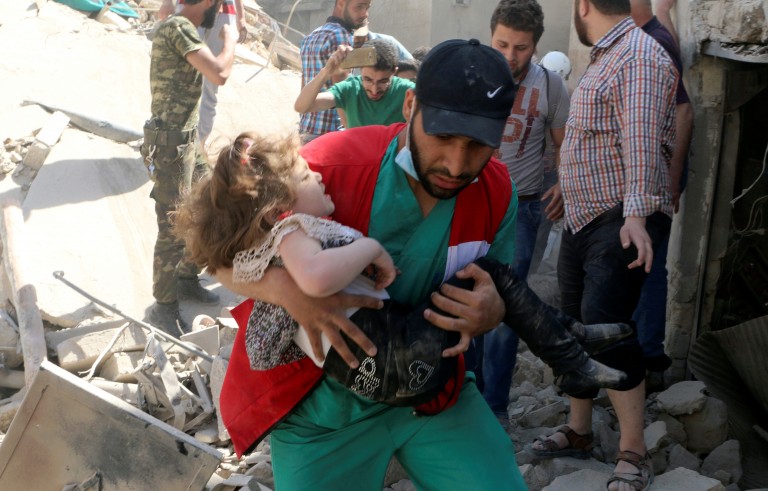(单词翻译:单击)
HARI SREENIVASAN: We return to the bombing of the hospital in the Syrian town of Aleppo. According to reports, 27 people were killed.
With me now is Pablo Marco, Middle East operations manager for Doctors Without Borders, which supports the facility.
Pablo, you have probably been in touch with your colleagues on the ground there. What's the latest they're telling you?
PABLO MARCO, Doctors Without Borders: Yes.
So, we are speaking with the head of the hospital just a couple of hours ago to go the last — and he was telling us how all these events unfolded. He explained to us that, 10:00 p.m. yesterday, two barrel bombs fell close to the hospital.
Then a lot of wounded people were driven to the hospital. Directors were waiting at the gate of the hospitals to know about the news about the families. And it was at that moment that the third barrel bomb fell at the entrance of the hospital in the emergency room, provoking this massive killing of people.

HARI SREENIVASAN: It was actually staged so that the people would rush to the hospital, there would be more people there for that secondary attack?
PABLO MARCO: So, we cannot ascertain it, but all elements show this, that this attack was, as you say, staged to provoke the maximum number of citizens killed.
HARI SREENIVASAN: So, tell me what kind of impact it means to not have this facility in this corner of the city.
PABLO MARCO: Well, there are already very few facilities working in Aleppo.
We need to know around 95 percent of the doctors in Aleppo have either fled or they have been killed by bombings already. So, every single facility that is destroyed or every single doctor that is killed has a massive impact.
This hospital was a reference hospital for pediatrics and, in addition, one of the key hospitals for internal medicine, especially for the so very, very high impact, for sure.
HARI SREENIVASAN: So, how many people, roughly, are treated in this facility, and how long are the wait lines, so to speak? There's probably not that many options for people in that area.
PABLO MARCO: Yes, exactly, exactly.
We were talking with the director. He was telling us that all the wounded have been taken to the hospitals, but, of course, they are absolutely overwhelmed, as you can imagine.
HARI SREENIVASAN: And what does it mean for this hospital to be supported by Doctors Without Borders? What's your involvement there?
PABLO MARCO: Yes.
So, we have been working with them for at least now three years. We have been in Aleppo. We were going to the hospital every other week, providing support in terms of technical advice medical equipment.
In the last year, the hospital was attacked twice also with barrel bombings. And at that time, also, after the request for support, we provided new equipment to restart the hospital. And even until this week, we were having direct conversations and about donations.
HARI SREENIVASAN: So, what happens now? Are you sending in more doctors into this hospital, into this area?
PABLO MARCO: So, we will keep supporting these hospitals, if we are able to make it happen, to make it work again. It's not very clear.
And we will keep supporting many other hospitals in Aleppo city. At the same time, something important we need to know is that we think it is really important that there is an independent investigation to clarify who has been responsible for this attack. And if this attack has been delivered, some elements can point out.
We will — there will be a for the resolution in the city council in the next days regarding the protection of hospitals. And this terrible event shows us that this resolution is more important now in the city than ever.
HARI SREENIVASAN: Are there any other aid agencies that are going to come in and try to fill that gap? Who else supports this hospital? What happens to all those people in that region who no longer have access to any facilities?
PABLO MARCO: There's not much more that anyone can do until the attacks on the hospital are finished.
We need to understand that anyone is really afraid to go to Aleppo now. Doctors, medical staff, they are a target in this war. Hundreds of them have been killed. Unfortunately, it's really difficult to replace those having been killed in this attack yesterday.
HARI SREENIVASAN: Do you see this as a pattern now to target medical facilities? It's not just in Syria, but in other parts of the world, too.
PABLO MARCO: Yes, yes.
We are seeing it happening. You were talking just a few minutes ago about the attack in Afghanistan. We have had several attacks in Yemen also in the last month. Especially the most worrying in the situation in Syria, where there have been tens, if not hundreds of attacks against medical facilities. And this trend is even worsening in the last, say, six months.
HARI SREENIVASAN: There was that other story in the news today.
Does your organization have any sort of a response yet to the U.S. government deciding to discipline 16 members of the U.S. military in that tragedy that affected the hospital in Kunduz last year, the Doctors Without Borders hospital?
PABLO MARCO: Yes. Yes.
So, what I will say is that, since this terrible event happened, we're having — asking the U.S. government and to other actors that we think really that we need an independent investigation to clarify what has happened in this attack.
The U.S. government has carried out their own investigation, but, of course, it hasn't been independent. And we keep asking for this investigation to happen.
HARI SREENIVASAN: All right, Pablo Marco of Doctors Without Borders, thanks so much for joining us tonight.
PABLO MARCO: Thank you to you. Bye-bye.


